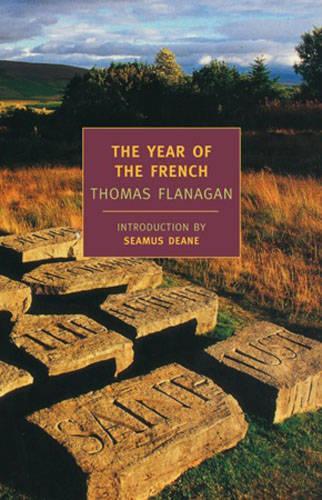
The Year Of The French
(Paperback, Main)
Publishing Details
The Year Of The French
By (Author) Thomas Flanagan
New York Review Books
NYRB Classics
15th June 2004
15th January 2004
Main
United States
Classifications
General
Fiction
813.54
Physical Properties
Paperback
544
Width 132mm, Height 206mm, Spine 30mm
580g
Description
In 1798, Irish patriots, committed to freeing their country from England, landed with a company of French troops in County Mayo, Ireland. They were the advance guard, to be followed by other French ships with the leader of the rebellion, Wolfe Tone. Briefly they triumphed, raising hopes among the impoverished local peasantry. But help was too late and too little, and before long the insurgency collapsed before a brutal English counter-attack. The Year of the French brings to life peasants and landlords, Protestants and Catholics, soldiers, politicians and poets, along with old and abiding questions of secular and religious commitments, empire, occupation and rebellion. It is quite simply a great historical novel.
Reviews
Flanagans method is to plunge the reader into a strange, wild, poetic, cruel, and finally hopeless world of Irish peasants, absentee British landlords, revolutionary terrorists, and men and women trying to hold on to what they have in a universe threatening to turn upside down. You have to make your own way through this landscape, so the stranger everything is for you, the more adventurous the experience. The story Flanagan tells makes our own dark times seem eminently manageable. I wanted to be taken somewhere else by a book, and I was. Louis Menand,The New Yorker
"...a circumspect and grippingly authentic account that stands as a stark warning against the romanticisation of torrid times. The result is a classic of historical fiction The Times (London)
I recall the excitement when this book was published in the late 1970's - and then discovered (not always the case) that the book merited it. Flanagan, an American history professor of Irish descent, pulled off a substantial coup in that he brought a historian's training to bear upon a romantic moment, the period when the French landed in the west of Ireland in 1798 and all Ireland thought liberation was at hand. His research never lies around the novel in pools, it stains the entire fabric, so that when his character's point of view is emerging from a dispossessed farmer's clay hovel or a small town merchant's table in the local hotel, we smell them - their clothes, their breath and (this is Ireland after all) their politics. Frank Delaney, The Guardian
"A masterwork of historical fiction." The Philadelphia Inquirer
"The book's wide-ranging scope and erudition are reminiscent of Tolstoy." Chicago Tribune
"This deserves every major literary prize." Publishers Weekly
In his prodigious first novel, Thomas Flanagan grants this historic episode a new and panoramic life....[a] thoughtful, graceful elegy. Mayo Mohs, Time
Such a brutal and pathetic story would alone have sufficed to make this book absorbing, but Flanagan has much more on his mind. He means to create not only a plausible sense of place and character, and an accurate account of evens, but to recreate, from barroom to manor hall, the entire intellectual and emotional climate of the time....not only a serious book...but a distinguished one as well. Peter S. Prescott, Newsweek
a rich and complex narrative...[an] extraordinary achievement" George Garrett, The New York Times
"I haven't so enjoyed a historical novel since The Charterhouse of Parma and War and Peace." John Leonard, The New York Times.
handsomely written...[a] splendid novel. Denis Donogue, The New York Review of Books
"Thomas Flanagan was one of irish-America'sone of the literary world'sgreat treasures. he wrote in flowing, baroque sentences that defied literary conventions born of minimalism and the modern attention span. His novels had texture and context, and wereastonishinglycritical successes and popular bestsellers." Terry Golway, The Irish Echo
Author Bio
Thomas Flanagan (1923-2002) was an Irish-American, born in Connecticut. After serving in the Navy, he studied for his PhD at Columbia University, during which time his thesis was published as a book- The Irish Novelists (1959). His novels include The Year of the French, The Tenants of Time, and The End of the Hunt. Seamus Deane was shortlisted for the Booker Prize for Fiction in 1996 for his novel Reading in the Dark.
